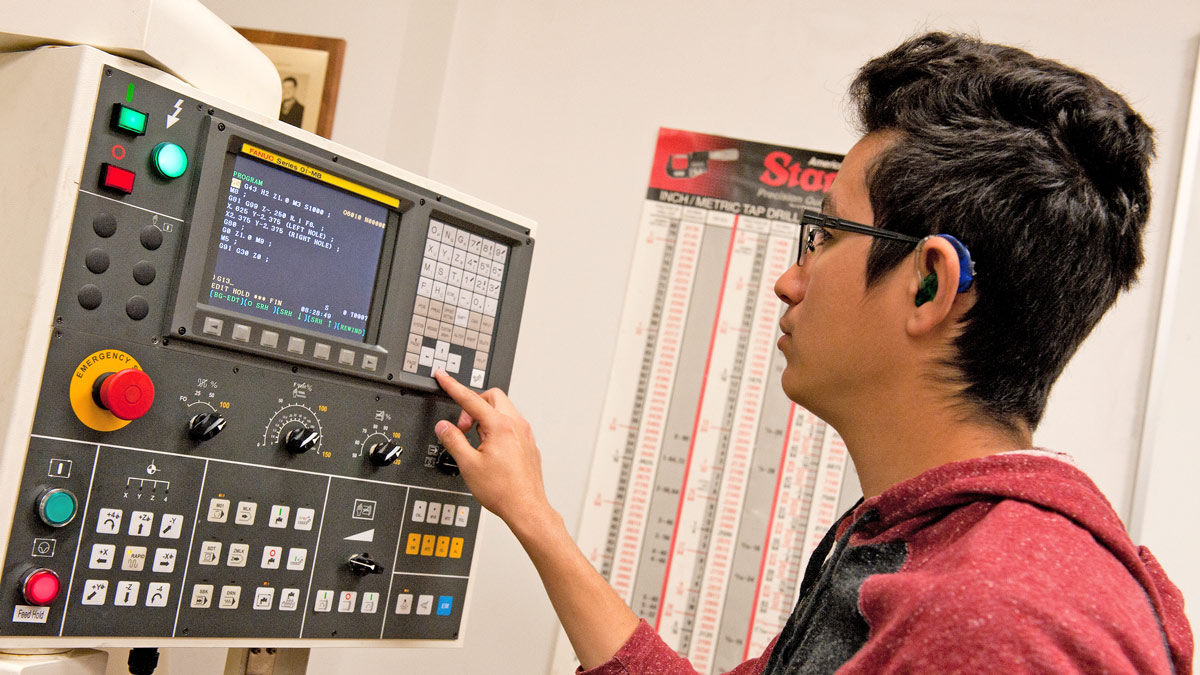Precision Manufacturing Technology Associate in Occupational Studies Degree

Precision Manufacturing Technology
Associate in Occupational Studies Degree
- RIT /
- Rochester Institute of Technology /
- Academics /
- Precision Manufacturing Technology AOS
Shape precision engineering with an AOS program in Precision Manufacturing Technology. Craft cutting-edge solutions.
Overview for Precision Manufacturing Technology AOS
Students in the associate in occupational studies (AOS) degree in precision manufacturing technology are prepared for employment in precision machining and/or precision optics manufacturing occupations. These include tool and die making, mold making, instrument making, manufacturing of optical elements, and computer numerical control machining (CNC). Graduates are successfully employed in both large manufacturing corporations and small contract manufacturing shops. This program is available for qualified deaf and hard of hearing students.
The precision manufacturing technology program, offered by RIT's National Technical Institute for the Deaf, prepares you for immediate employment upon graduation. Some of the job responsibilities for graduates include: set up and operate lathes, milling machine tools, grinders, polishers, computer numerical controlled machine tools, and computer-aided manufacturing (i.e., 5-axis); shape material into precision parts by conventional and nonconventional processes; follow blueprints; and use advanced measuring techniques to inspect work.
-
Join us for Fall 2026
There's still time to apply. For some programs, applications will be reviewed on a rolling, space-available basis.
Careers and Cooperative Education
Typical Job Titles
| Computer Numerical Control (CNC) Operator | Computer Numerical Control (CNC) Programmer Trainee | Tool and Die Maker |
| Instrument Maker | Mold Maker | Pattern Maker |
| Model Maker | Machinist |
Industries
-
Manufacturing
-
Construction
-
Automotive
-
Aerospace
Cooperative Education
Cooperative education, or co-op for short, is full-time, paid work experience in your field of study. And it sets RIT graduates apart from their competitors. It’s exposure–early and often–to a variety of professional work environments, career paths, and industries. RIT co-op is designed for your success.
Students in the precision manufacturing technology program are required to complete a cooperative education work experience prior to graduation. You may schedule your co-op after completing your second-year academic requirements.
Curriculum for 2025-2026 for Precision Manufacturing Technology AOS
Current Students: See Curriculum Requirements
Admissions and Financial Aid
For the career-focused AOS Degree
- 2 years of math required
- 1 year of science required
- English language skills as evidenced by application materials determine associate degree options.
Specific English, Mathematics and Science Requirements and other Recommendations
Successful completion of a sampling experience either through the Summer Vestibule Program or an equivalent career exploration course is a prerequisite, as are the following:
- English: Placement into NENG-114 Literacies II or above. To earn the AOS degree, students must complete all necessary NENG coursework through NENG-115 Literacies III or they must place into an English course above NENG-115 Literacies III.
- Mathematics: Placement into Foundations of Algebra (NMTH-180) or a higher-level course. Typically, students entering this major will have completed at least three years of high school mathematics.
- Science: Typically, students entering this major will have completed at least two years of high school science.
- ACT (optional): The ACT middle 50% composite score is 14-17.
Financial Aid and Scholarships
100% of all incoming first-year and transfer students receive aid.
RIT’s personalized and comprehensive financial aid program includes scholarships, grants, loans, and campus employment programs. When all these are put to work, your actual cost may be much lower than the published estimated cost of attendance.
Learn more about financial aid and scholarships
Accreditation
Contact
Karen Beiter, Chairperson
585‑286‑4546, kjbndp@ntid.rit.edu
Department of Engineering Studies













